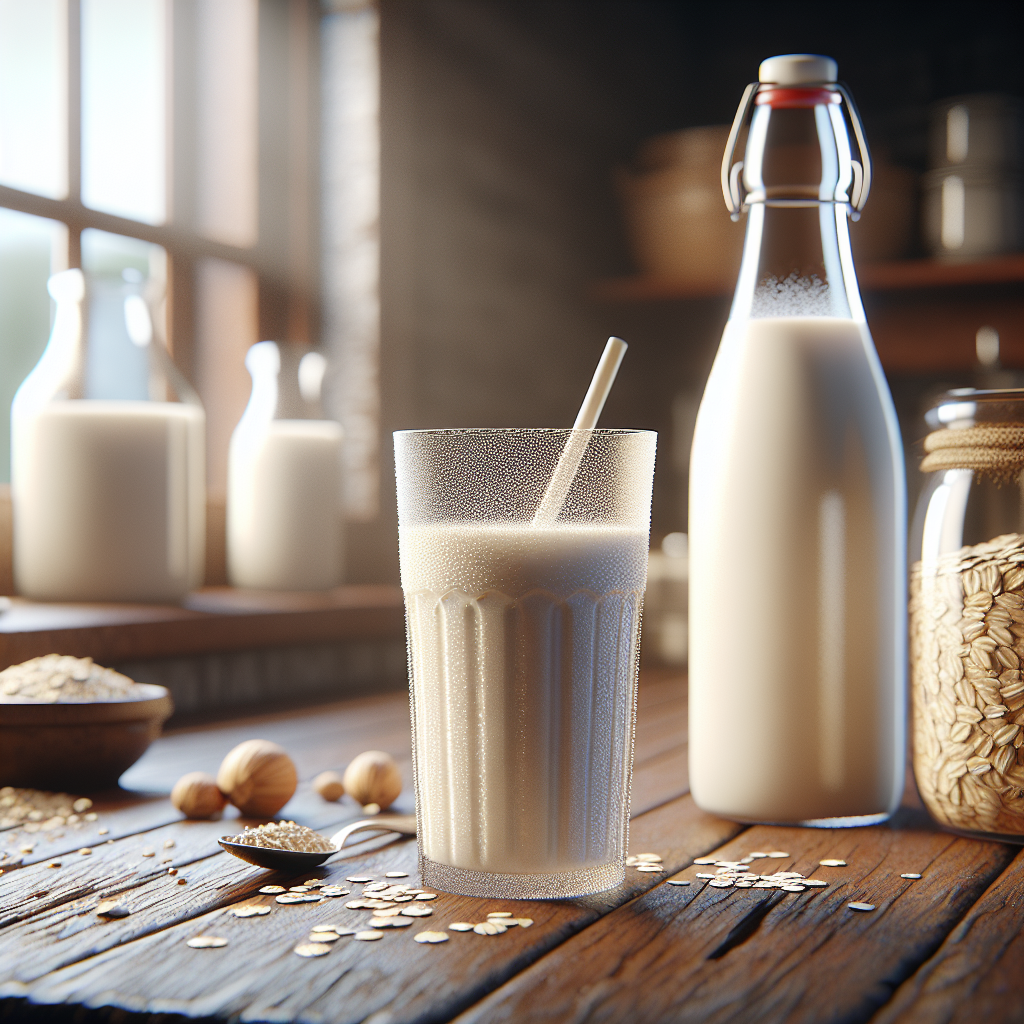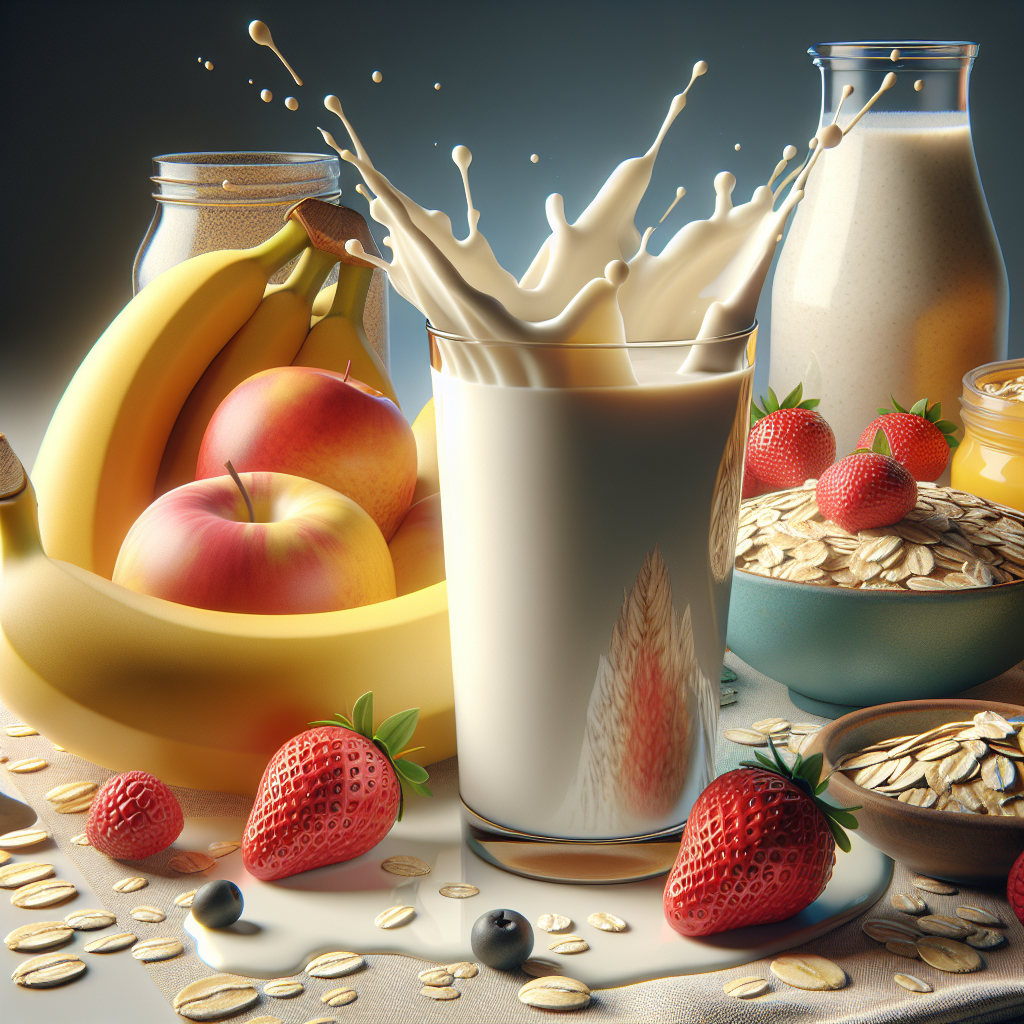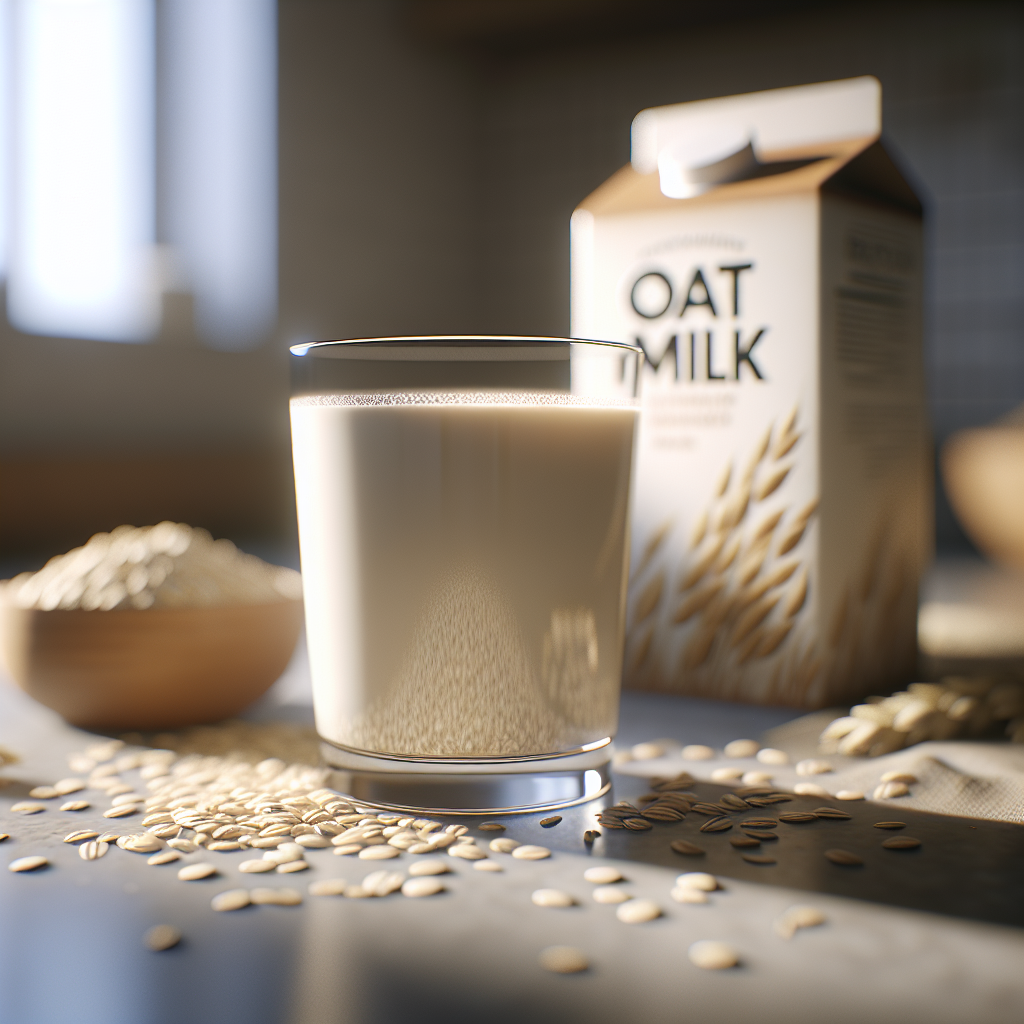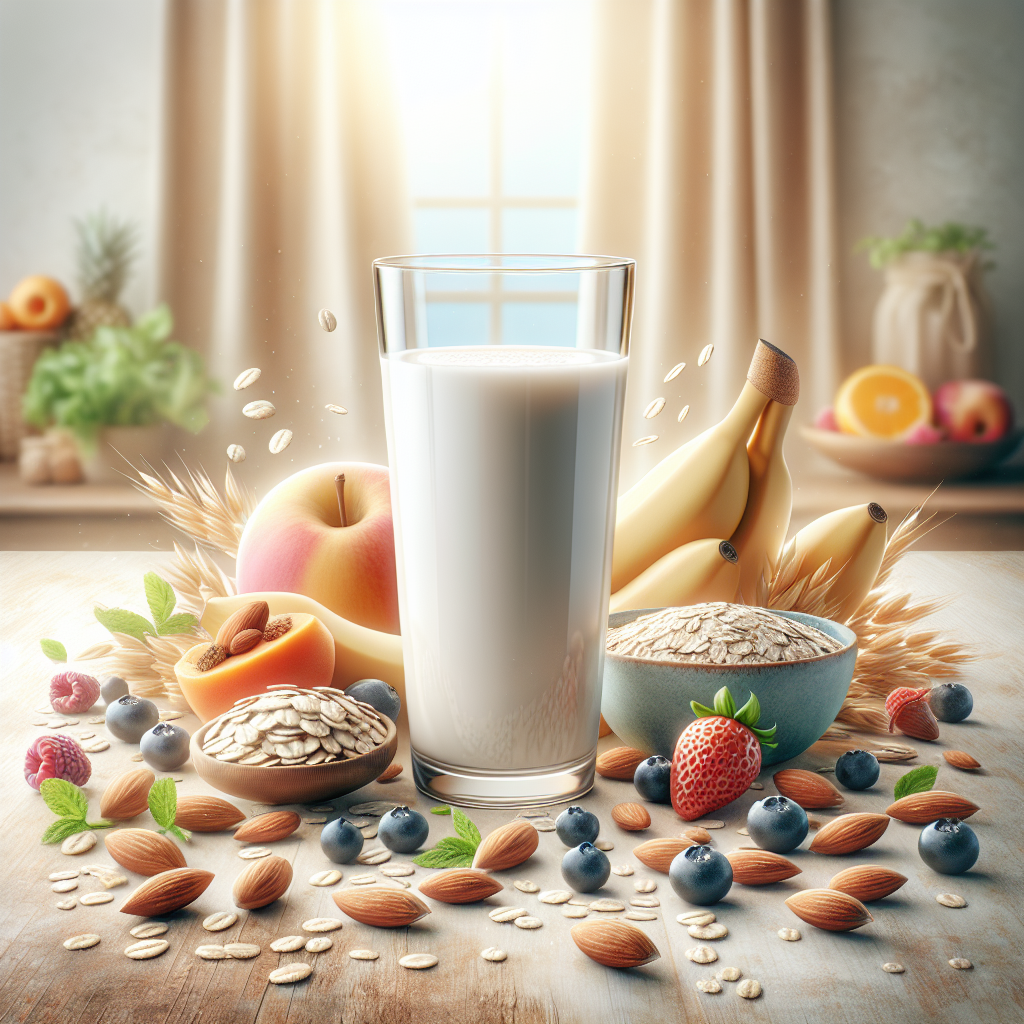Oat milk has rapidly gained popularity as a leading dairy-free alternative, and for good reason. This versatile and delicious beverage is not only lactose-free, but also packed with numerous health benefits. Made from whole oats, oat milk is naturally high in essential nutrients like fiber, protein, and vitamins, making it an excellent choice for those looking to maintain a balanced diet.
Oat milk nutrition. It contains beta-glucan, a type of soluble fiber that has been shown to improve heart health by reducing cholesterol levels. Additionally, oat milk is often fortified with vitamins such as vitamin D, B12, and calcium, contributing to stronger bones and enhanced energy levels.
Moreover, oat milk is a fantastic option for individuals with dietary restrictions. It is naturally free from lactose, nuts, and soy, making it suitable for people with various food allergies and intolerances. Furthermore, its creamy texture and mild, slightly sweet flavor make it a versatile ingredient in both sweet and savory dishes.
But the benefits of oat milk extend beyond personal health; it's also an eco-friendly choice. Oats require less water to grow compared to almonds or dairy production, and they produce fewer greenhouse gases. By choosing oat milk, you're not only benefiting your body but also contributing to a more sustainable planet.
Ready to revolutionize your dairy-free lifestyle? Get yours today!
Nutritional Value of Oat Milk

When it comes to nutritional value, oat milk is a powerhouse that can rival traditional dairy milk. One of the primary reasons people opt for oat milk is its rich content of essential nutrients. A typical serving of oat milk contains a balanced mix of carbohydrates, proteins, and fats, making it a well-rounded choice for any diet.
Oat milk is particularly high in fiber, especially the soluble fiber known as beta-glucan. This type of fiber is renowned for its ability to lower cholesterol levels and improve heart health. Additionally, beta-glucan helps regulate blood sugar levels, making oat milk a beneficial option for those managing diabetes or looking to maintain steady energy throughout the day.
In terms of vitamins and minerals, oat milk does not disappoint. Most commercially available oat milk is fortified with vitamins such as vitamin D and vitamin B12, which are crucial for bone health and red blood cell production, respectively. It also contains a good amount of calcium, which is essential for maintaining strong bones and teeth.
Moreover, oat milk is a good source of plant-based protein. While it may not have as much protein as cow's milk, it still provides a decent amount, making it a suitable option for those following a vegan or vegetarian diet. The protein found in oat milk includes all nine essential amino acids, which are vital for muscle repair and overall bodily functions.
Another advantage of oat milk is its lower fat content compared to whole milk. It contains primarily unsaturated fats, which are considered heart-healthy fats. These fats can help reduce the risk of cardiovascular diseases and improve overall lipid profiles.
Considering its comprehensive nutritional profile, it's easy to see why oat milk is becoming a popular choice for health-conscious individuals. Whether you're seeking to boost your nutrient intake or looking for a lactose-free alternative, oat milk offers a versatile and nutritious option.
Oat Milk vs Dairy Milk

When comparing oat milk to dairy milk, several key differences and benefits come to light. Both beverages have their unique attributes, but understanding these can help you make an informed choice based on your dietary needs and lifestyle preferences.
Firstly, one of the most significant differences is the lactose content. Dairy milk contains lactose, a sugar that many individuals find difficult to digest due to lactose intolerance. Oat milk, on the other hand, is naturally lactose-free, making it a more accessible option for those with lactose intolerance or dairy allergies.
In terms of caloric content, oat milk tends to be lower in calories compared to whole dairy milk. This can be an advantage for those looking to manage their calorie intake while still enjoying a creamy and nutritious beverage. However, it's important to note that some flavored or sweetened oat milk varieties may have added sugars, so always check the label.
Nutritionally, dairy milk is known for its high protein content, typically offering around 8 grams of protein per cup. Oat milk, while slightly lower in protein, still provides a decent amount, usually around 2-4 grams per cup. Additionally, oat milk contains all nine essential amino acids, making it a valuable protein source for plant-based diets.
Another point of comparison is the fat content. Dairy milk, especially whole milk, contains higher levels of saturated fats. Oat milk, however, contains primarily unsaturated fats, which are considered healthier for heart health. This makes oat milk a better option for those looking to reduce their intake of saturated fats.
Oat milk also shines in its fiber content. Unlike dairy milk, oat milk contains soluble fiber, specifically beta-glucan, which has been shown to lower cholesterol levels and improve heart health. This added fiber can also aid in digestion and help keep you feeling fuller for longer.
From an environmental perspective, oat milk has a smaller ecological footprint compared to dairy milk. Producing oat milk generally requires less water, land, and energy, making it a more sustainable choice for eco-conscious consumers.
In summary, while both oat milk and dairy milk have their unique benefits, oat milk stands out for its lactose-free nature, lower calorie content, heart-healthy fats, and additional fiber. Whether you're driven by health considerations, dietary restrictions, or environmental concerns, oat milk offers a compelling alternative to traditional dairy milk.
Environmental Impact of Oat Milk Production

The environmental impact of oat milk production is a critical factor that sets it apart from other milk alternatives, especially dairy milk. Understanding the ecological footprint of your food choices can help you make more sustainable decisions, and oat milk is a standout in this regard.
One of the primary environmental benefits of oat milk is its low water usage. Producing oat milk requires significantly less water compared to dairy milk and even other plant-based milks like almond milk. For instance, producing one liter of oat milk uses about 48 liters of water, while the same amount of dairy milk can require up to 628 liters. This dramatic difference makes oat milk a more water-efficient choice, particularly important in regions facing water scarcity.
In addition to conserving water, oat milk production also has a lower carbon footprint. Oats are a less resource-intensive crop to grow, requiring less land and emitting fewer greenhouse gases compared to dairy farming. Dairy cows produce methane, a potent greenhouse gas, contributing significantly to global warming. Oat farming, on the other hand, has minimal methane emissions, making it a more environmentally friendly option.
Another aspect to consider is land use. Dairy farming requires vast amounts of land for grazing and growing feed crops for cows. In contrast, oats can be grown in a variety of climates and soil conditions, often requiring less fertile land. This efficient land use reduces the pressure on ecosystems and helps preserve natural habitats and biodiversity.
Moreover, the process of making oat milk is relatively simple and involves fewer processing steps compared to dairy milk. This simplicity not only conserves energy but also results in fewer waste byproducts. Additionally, many oat milk producers are committed to sustainable practices, such as using organic oats and eco-friendly packaging, further reducing the environmental impact.
It's also worth noting that oats are a resilient crop, capable of growing in various climates and soil conditions, which reduces the need for chemical fertilizers and pesticides. This resilience contributes to healthier soil and reduces pollution from agricultural runoff.
In conclusion, the environmental impact of oat milk production is significantly lower than that of dairy milk and even other plant-based milks. By choosing oat milk, you're supporting a more sustainable and eco-friendly food system, helping to conserve water, reduce greenhouse gas emissions, and protect natural habitats.
How to Make Oat Milk at Home

Making oat milk at home is an easy and cost-effective way to enjoy this delicious and nutritious dairy-free alternative. With just a few simple ingredients and the right equipment, you can have fresh oat milk ready in no time.
To start, you’ll need the following ingredients:
- 1 cup of rolled oats
- 5-6 cups of filtered water
- Optional: a pinch of salt, a teaspoon of vanilla extract, or a sweetener like maple syrup or honey
Here's a step-by-step guide on how to make oat milk at home:
- Blend the ingredients: Add 1 cup of oats to the filter basket along with any sweeteners or flavors of your choosing. Add water to the pitcher between 1300ml and 1600ml (min and max lines). Attach the filter basket to the top, and then attach the top to the pitcher. Press the mode button to select Nut Milk and then press start.
- Enjoy: In less than 60 seconds your milk will be ready to drink. Enjoy!
For those looking to streamline this process, the revolutionary blender from MilkDepot.com can simplify and speed up the entire procedure instead of wasting time straining with nut bags and having to clean a big mess everyday. This specialized blender can turn any nut, grain, or seed into fresh, filtered milk in less than 60 seconds, making it a perfect tool for busy individuals and families. It's even faster to clean!
Additionally, making oat milk at home allows you to control the ingredients, ensuring there are no additives or preservatives. You can also experiment with different flavors and sweetness levels to suit your taste preferences.
Delicious Oat Milk Recipes to Try
Once you've mastered making oat milk at home, the possibilities for delicious and nutritious recipes are endless. Here are some delightful oat milk recipes to try that are sure to become favorites in your household:
- Oat Milk Latte: For a creamy and comforting beverage, heat up a cup of your homemade oat milk and froth it using a milk frother. Pour it over a shot of espresso or strong brewed coffee. Add a touch of vanilla extract or a sprinkle of cinnamon for extra flavor.
- Oat Milk Smoothie: Blend a cup of oat milk with your favorite fruits like bananas, berries, or mangoes. Add a handful of spinach or kale for a green smoothie boost. Sweeten with honey or maple syrup if desired.
- Oat Milk Pancakes: Replace the dairy milk in your pancake recipe with oat milk for a fluffy and dairy-free breakfast treat. Mix in some fresh blueberries or chocolate chips for added flavor.
- Oat Milk Ice Cream: Use oat milk as a base for homemade ice cream. Combine it with sweetened condensed coconut milk, vanilla extract, and your favorite mix-ins like cookie dough or fruit puree. Churn it in an ice cream maker for a creamy, dairy-free dessert.
- Oat Milk Hot Chocolate: Heat up a cup of oat milk and mix in cocoa powder and a sweetener of your choice. Top with dairy-free whipped cream and a sprinkle of cocoa or cinnamon for a cozy treat.
These recipes not only showcase the versatility of oat milk but also highlight how easy it is to incorporate this dairy-free alternative into your everyday meals and snacks. Experiment with your own flavor combinations and enjoy the benefits of homemade oat milk.
Ready to make your own oat milk and try these delicious recipes? Get yours today! The MilkDepot.com blender will make the process quick and efficient, allowing you to enjoy fresh oat milk in less than 60 seconds.
